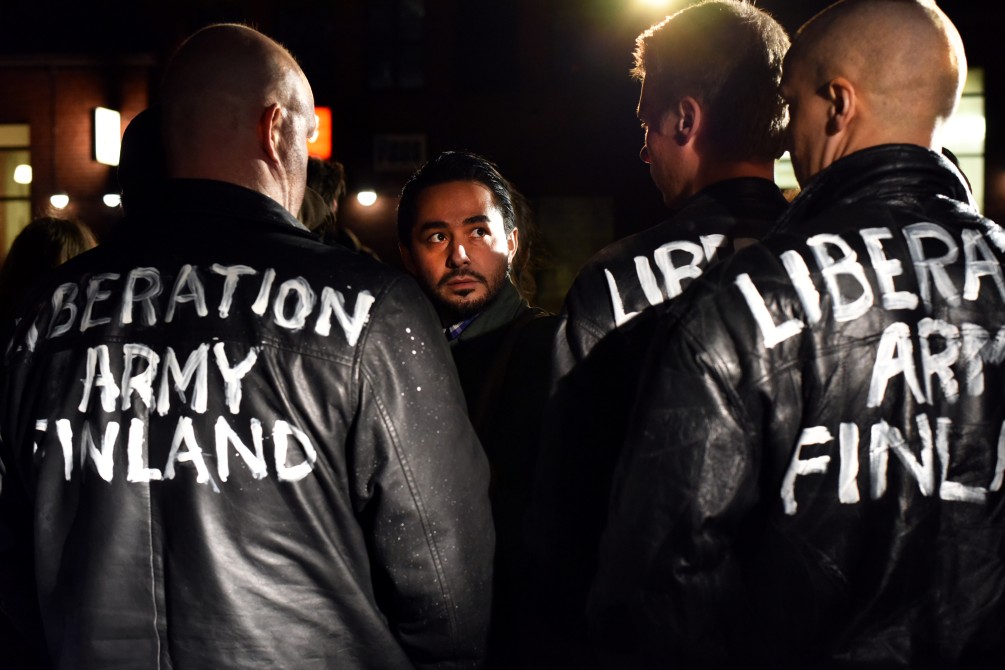
by Steve Prokopy
A master of comedic deadpan for more than 30 years, Finnish writer-director Aki Kaurismäki (LENINGRAD COWBOYS GO AMERICA, THE MATCH FACTORY GIRL, THE MAN WITHOUT A PAST, LE HAVRE) returns with THE OTHER SIDE OF HOPE, an honest and sometimes solemn look at the migrant and refugee crisis throughout Europe. Rest assured, this doesn’t mean the filmmaker has abandoned his trademark humor and love of local musicians, but he does acknowledge that many nation’s closed-border policies, or simply shipping immigrants back from where they came, are not fair and just practices for the long term.
Kaurismäki tells his parable by actually telling two that eventually intersect. Khaled Ali (Sherwan Haji) is a Syrian refugee who has stowed away on a Helsinki-bound freighter. The first time we see him, he emerges from a pile of coal, coating his face and clothes with black dust. It’s an alarming image, especially since we’re not sure if his intentions in Finland are good or bad. In fact, Khaled is at the tail end of a long search for his missing younger sister Miriam (Niroz Haji), whom he lost as he crossed the border into Turkey. They were separated, the border was shut down, he was on one side, she was on the other; since then, he has never stopped looking for her. But in Helsinki, a place he had been told was friendly to refugees, he wants to set up residence and begin the search for Miriam in earnest.
The other story is perhaps on that will feel more familiar to admirers of Kaurismäki’s previous works. A middle-aged man Finnish dress shirt salesman named Wikström (Sakari Kuosmanen) sells off his remaining inventory, leaves his drunken, bitter wife, and takes all of his money to a high-stakes poker game where he manages to win quite a bit of cash. His plan is to fulfill his dream of opening up a successful restaurant, so he buys a rundown establishment known as the Golden Pint, which comes with a handful of quirky employees and not many regular customers. But Wikström is confident and willing to try different menus to see what clicks—a one-day attempt at serving sushi does not go well, but bringing in live music seems to pack them in.
What brings these two men together is pure chance. Khaled is denied asylum in Finland and is on the verge of being shipped back to Syria and certain death, when he escapes a holding facility and finds a place to sleep by the garbage cans outside Wikström’s restaurant. Representing the best that the country has to offer, Wikström not only give Khaled a job but spends a ridiculous amount of money getting him authentic-looking fake credentials that fool even their equivalent of the INS. Wikström also gives him a place to stay, and before long, the pair—along with the restaurant’s host, chef, and one waitress—form an unlikely but protective family (or nation) of their own, where everyone is equal.
Kaurismäki never lets us forget that Khaled is in constant danger—from both the authorities and white nationalists that roam the streets at night—anytime he steps outdoors, but when in the confines of this weird little dining establishment, he’s safe at home. The filmmaker uses local musicians (Toshitake Shinohara is a real standout) to provide most of the film’s music and give us visual and aural transitions between the two stories, as everything from street players to bar bands perform lively renditions of everything from indigenous folk music to American-influenced blues.
The winner of the Silver Bear at this year’s Berlin International Film Festival, THE OTHER SIDE OF HOPE moves effortlessly from drama to comedy, tension-filled threat of anti-immigrant violence to celebratory cross-cultural brotherhood between complete strangers. We’re never given a clear sense of why Wikström is so willing to put himself in danger to help Khaled, but that adds such significant weight to his above-and-beyond actions. Perhaps he sees a bit of his struggle to escape his soul-crushing life in Khaled’s desperate actions. Or maybe Khaled’s troubles make Wikström realize his issues aren’t so bad. Whatever might be the case, there is a deep-seated goodness and kindness running through this movie that is undeniably touching.
While Haji plays Khaled with the impassioned desperation you might expect from a man in his situation, Kuosmanen’s portrayal of Wikström is remarkably (and, I’m assuming, deliberately) blanked-faced and passionless, resulting in a truly unusual but still very funny performance, one that feels like it could never be taught. He’s just that good at both being a expressionless and the object of endless curiosity, making him one of the most Kaurismäkian inventions to date.
It’s not necessarily fair to say that THE OTHER SIDE OF HOPE is an example of Kaurismäki with an agenda, but that’s also not inherently a bad thing if it were true. The filmmaker asks his audience to not only laugh (as he always does) but to contemplate, to put themselves in the shoes of a person they will likely never be or know. And it is this small amount of empathy that is the price one must pay to experience the latest from the 60-year-old master.
Steve Prokopy is the Chief Film Critic for the Chicago-based arts outlet Third Coast Review (www.ThirdCoastReview.com).
CLICK HERE for Showtimes & Advance Tickets for THE OTHER SIDE OF HOPE
